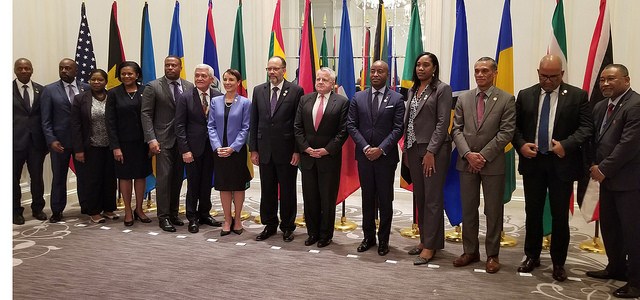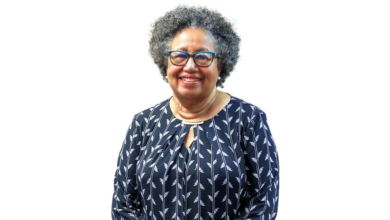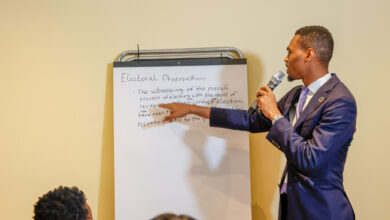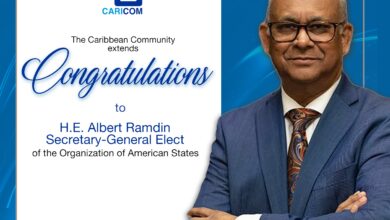This strategic position of the Caribbean Community (CARICOM) in the globe is strengthening as the international community seeks opportunities for engagement, providing platforms for greater attention to CARICOM’s interests and concerns.
This was underlined during CARICOM’s participation in the recently-concluded 73rd Session of the United Nations General Assembly (UNGA) and several “side events” with Third States and multilateral groupings. CARICOM had engagements with the United States of America, the United Kingdom, Canada, Japan, the group of Nordic countries, the Pacific Island Forum, the Commonwealth of Nations, the Organisation of American States (OAS), and the Central American Integration System (SICA).
CARICOM Secretary-General, Ambassador Irwin LaRocque, led the Secretariat’s delegation which included Assistant Secretary-General, Foreign and Community Relations, Ambassador Colin Granderson. The Secretary-General participated in several events including a High Level Round Table discussion sponsored by the International Renewable Energy Agency (IRENA), titled SIDS Lighthouse Initiative 2.0: Increasing Ambition to Acceleration Energy Transformation in Small Island Developing States, and The Netherlands’ Ministry of Defence organised discussion titled, Strengthening International Cooperation in Maritime Security in the Caribbean.
A CARICOM Breakfast event to launch the Caribbean Moves initiative was the high-point of the Community’s presence in New York, late September. This initiative, which is guided by the theme Moving Caribbean people towards healthier lives – Step it up! was launched on the sidelines of the Third UNGA High Level Meeting on Chronic Non-Communicable Diseases (NCDs).
 CARICOM Heads of Government and Secretary-General and other officials at the launch of Caribbean Moves (Photo via PMSKN)
CARICOM Heads of Government and Secretary-General and other officials at the launch of Caribbean Moves (Photo via PMSKN)
The initiative represents a re-commitment by CARICOM Heads of Government to scale up and adjust their response to the NCDs epidemic through a number of actions including this one. Caribbean Moves, builds on the experience of the Jamaica Moves initiative which created a movement that promotes physical activity, healthy eating and age-appropriate health checks at the level of the school, workplace and community.
The launch of Caribbean Moves featured Prime Minister, St Kitts and Nevis, The Hon. Timothy Harris, Lead Prime Minister in the CARICOM Quasi Cabinet for Health; Chairman of CARICOM, The Hon Andrew Holness, Prime Minister of Jamaica; Prime Minister of Saint Vincent and the Grenadines, Dr. The Hon Ralph Gonsalves; and Prime Minister of Barbados, The Hon. Mia Amor Mottley, the newest CARICOM Head of Government.
The event also attracted high-level representatives from the international community including the WHO, the UNGA, PAHO, Caribbean regional civil society and CARICOM health-related regional institutions.
Reviewing CARICOM’s work at the UNGA, New York, 24-29 Sept. 2018 from Caribbean Community on Vimeo.
According to Ambassador Granderson in a recent interview, the UNGA was “a very important platform when it comes to international relations and the possibility for engagement with Third States which one does not ordinarily meet or have the opportunity to meet.”
“The importance is underlined by the level of participation of many countries including the largest countries of the world,” he said.
CARICOM maximized its presence in New York to articulate concerns on graduation from access to concessional development financing through the use of GDP per capita and the black-listing of some Member States as non-cooperative tax jurisdiction by the European Union. CARICOM has consistently emphasized that labels such as non-cooperative tax jurisdictions and tax havens have wreaked irreparable reputational damage on the small, highly vulnerable economies of the Region and their ability to maintain the economic development gains achieved so far, given the reliance of revenue from financial services.
Earlier in September, the Council of Finance and Planning (COFAP), which met in Barbados, noted the European Union authorities’ stance on the blacklisting and agreed to broaden CARICOM’s political engagement to include interventions during the 73rd Session of the UNGA. In this regard, Member States articulated an agreed set of paragraphs on the issue in their statements to the General Assembly, Ambassador Granderson said.
A special meeting Council for Foreign and Community Relations (COFCOR) is a usual staple on the sidelines of the UNGA. This year, the 11th Special COFCOR was able to coordinate CARICOM’s positions on issues including the UN Security Council Reform, the implications for CARICOM in respect of the re-positioning of the UN Development System, Candidatures; issues related to migration, climate change, the High-Level Meeting on Middle Income Countries, the implementation of the Samoa Pathway, the Third United Nations High Level Meeting on Non-Communicable Diseases (NCDs).
Ambassador Granderson said that even though it is traditionally a health issue the subject of NCDs has been prominent on COFCOR’s agenda because of the critical need for financial and technical resources required by Member States to respond more effectively and efficiently to that challenge
“We need to strengthen our policy responses,” Ambassador Granderson said, adding that by placing NCDs on the international agenda, the Community could sensitive not only the wider international community but also development partners; and therefore increase the possibility of receiving resources and technical assistance for the fight against NCDs.
In September 2007, CARICOM made history when its Heads of State and Government (HOGs) convened the first summit on chronic noncommunicable diseases (NCDs) and issued the Port-of-Spain Declaration: Uniting against the epidemic of Chronic Non-Communicable Diseases (POSD). Subsequently, CARICOM successfully introduced NCDs into the UN development agenda which ultimately led to the first UN High Level Meeting (UNHLM) on the Prevention and Control of NCDs in New York in 2011.
Ambassador Granderson said diplomatic discussions during the UNGA served to strengthen political dialogue and the results were not necessarily immediate.However, he said the United States agreed on a dedicated meeting on disaster management and recovery. The issues which were likely to be addressed include the need for a regional insurance which will “facilitate the ordinary man”; strengthening cooperation modalities in meteorology including warnings for hurricanes and tropical storms; and technical support in disaster management and recovery.
The Sixth CARICOM-Japan Consultation, the formal mechanism for dialogue on cooperation modalities between the two parties, was also held on the sidelines of the UNGA. Discussions focused on issues pertaining to Climate Change and Disaster Risk Reduction, Sustainable Use of Living Marine Resources, UN Security Council Reform, the State of Affairs in Asia, which have implications the Caribbean Region, Blacklisting as well as Correspondent Banking and De-Risking.
Since 1993, CARICOM and Japan have worked steadfastly to strengthen relations as demonstrated by a number meeting over the years including one CARICOM-Japan Heads of Government Summit in 2014 – designated a CARICOM-Japan Friendship Year – five Ministerial Meetings, and 18 consultations.
Political and technical cooperation with Japan is particularly significant to CARICOM as the East Asian country has maintained an official decision to provide assistance to small island countries and others that face special vulnerabilities, including all CARICOM Member States, regardless of their per capita income.






